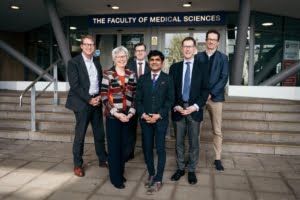We are pleased to announce that Lister Fellow Professor Dino Giussani has recently published the results of important new research on the factors that can increase heart disease.
The research indicates that heart disease risks actually begin during pregnancy – and the extent to which they affect a person later in life depends on the level of Oxygen that a baby experiences in the womb.
This is a very important area of study. Heart disease is the greatest cause of death globally and has led to a huge range of public interventions to limit typical lifestyle risk factors.
But while it is now common knowledge that a poor diet, smoking and a lack of exercise can all contribute to a greater risk of heart disease in adults, this study indicates that conditions and complications during pregnancy and birth can also have a significant effect.
“The gene-environment interaction before birth is just as, if not more, important in setting a future risk of cardiovascular disease” Professor Giussani states.
The new paper was published in PLOS Biology and entitled Intervention against hypertension in the next generation programmed by developmental hypoxia.
The research was conducted on sheep and was based at the University of Cambridge. In particular it was shown that individuals who experienced chronic hypoxia (i.e. reduced Oxygen levels) during pregnancy displayed higher instances of high blood pressure and stiff blood vessels in later life.
In some good news however the research also indicates that some of the impact may be preventable. Through the application of maternal treatment with the antioxidant vitamin C during a complicated pregnancy, the potential negative effects on the heart health of the offspring were shown to be mitigated. As Professor Giussani explains:
“Therefore our discoveries emphasise that when considering strategies to reduce the overall burden of heart disease, much greater attention to prevention rather than treatment is required. Treatment should start as early as possible during the developmental trajectory, rather than waiting until adulthood when the disease process has become irreversible.”
You can see more about the findings in this video on MSN News, and the results were also mentioned in the Daily Mail.
Dino Giussani is The Professor of Developmental Cardiovascular Physiology & Medicine at the Department of Physiology, Development and Neuroscience, University of Cambridge. His research covers various areas of reproduction including developmental programming and perinatal physiology.
We are very pleased to hear about Professor Giussani’s work, and delighted to have played a role in supporting such cutting edge research through a Lister Research Prize. We look forward to hearing more about this important research and its implications in the future.



